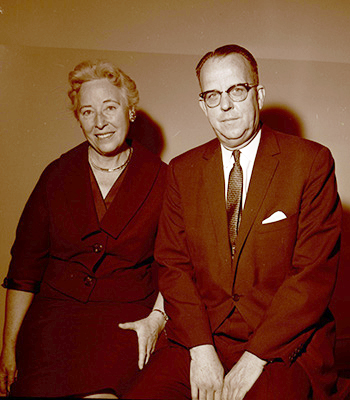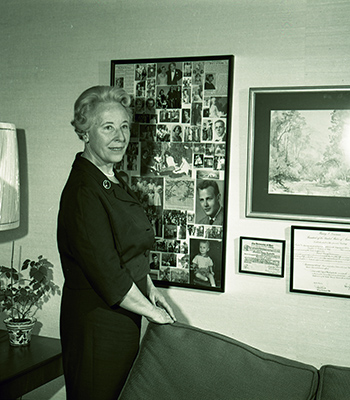Looking Back: Helen K. Richards Asked for Missionary Opportunities to Learn How to Serve
Contributed By Gerry Avant, Church News senior contributing editor

Sister Helen K. Richards, wife of Elder Franklin D. Richards of the Presidency of the Seventy, circa 1964.
Article Highlights
- Through study and prayer, Sister Richards gained her testimony when she was a young adult.
- Sister Richards asked for opportunities for missionary work in her ward when she wanted to learn more about how to teach the gospel.
- The Richards family accepted callings from the Lord even when they seemed inconvenient or scary.
“I prayed for a testimony and a testimony came, not all at once, but as I continued in my efforts, it came.” —Sister Helen K. Richards
Related Links
A former Church News colleague, John Hart, and I recently reminisced about some of our assignments and people we’ve met, including General Authorities and their wives. I mentioned Sister Helen Kearnes Richards. Before I could say more, John said, “She was a great missionary.”
Here are some insights to how she became a great missionary:
I met Sister Richards in 1976, shortly after her husband, Elder Franklin D. Richards, then Senior President of the Quorum of the Seventy, was called to serve on the Church’s Missionary Executive Committee.
As a young woman Sister Richards attended the University of Utah for two years but had to go elsewhere to pursue further training in her major, home economics. She attended and received a degree from Columbia University in New York City. After she returned to Salt Lake City she taught home economics at Murray High School. She and Franklin D. Richards, whom she had met at the University of Utah and waited for while he served in the Eastern States Mission, were married in 1923. They raised two daughters and two sons.
The Richards family lived 15 years in Washington D.C., where he was an executive with the Federal Housing Administration.
Sister Richards described one of the defining moments during those years. “Whether I had a testimony or not had really never bothered me until I was in a Relief Society meeting in which a member from the general board in Salt Lake City was speaking. She bore such a strong testimony. I thought, ‘I wish I felt that way.’
“This woman seemed to look straight at me as she said, ‘To gain a testimony, you have to want it.’
“I thought to myself, ‘I really do want a testimony.’ Then this sister added, ‘You must study for it.’”
Sister Richards said she realized she had studied to prepare lessons—but had never studied to gain a testimony. Then the visiting board member continued, “You have to work for a testimony.”
Sister Richards said, “I thought, ‘This is where I have to start.’ I did many of the same things I had done before, but with a different objective and purpose. I prayed for a testimony and a testimony came, not all at once, but as I continued in my efforts, it came. It was all I hoped it would be—a strong, motivating force in my life.”
She said she had been greatly impressed with many people who were not members of the Church in Washington; some had expressed interest in the Church. One of her greatest regrets was that she had not introduced them to the gospel.

Sister Helen K. Richards, wife of Elder Franklin D. Richards of the Presidency of the Seventy. Photo courtesy of the Church History Library.
“When we left Washington, I felt I had not done what I should have done in the way of missionary work among those fine nonmembers, because I didn’t know how,” she said.
As they were driving to Utah, her husband said, “Now we’re out of a Church job. I suppose when we get settled, the bishop will come around and ask us what we’ve done and what we’d like to do. What are you going to tell him?”
Sister Richards replied, “‘This is going to surprise you, but I’m going to tell him I’d like to be a stake missionary. I’d like to teach the gospel in a simple, understandable way.’ He said he would also like to be a stake missionary.”

Sister Helen K. Richards and her husband, Elder Franklin D. Richards of the Presidency of the Seventy, circa 1960. Photo courtesy of the Church History Library.
For two years, they served as leaders in stake genealogy work, and then he was called to preside over the East Mill Creek Stake mission, with Sister Richards called to assist him.
In 1959 Elder Richards was called to preside over the Northwestern States Mission. Sister Richards said she was somewhat concerned when the call came. “My mother wasn’t very well, and she was very dependent on me, her only daughter. We still had two children at the university. I said, ‘If the call could come a year or two from now, we would [be] more settled and it would be easier to accept.’”
Elder Richards asked, “Don’t you think Heavenly Father knows your problems?” Sister Richards answered in the affirmative, and Elder Richards replied, “Then there’s no problem.”
Sister Richards told me, “There was no more thought whether we should go or if there would be a better time.”
She said their mission was a wonderful experience, although it lasted just one year instead of the three years they expected to serve. In 1960, when they’d been serving just nine months, Elder Richards was called as an Assistant to the Quorum of the Twelve Apostles. He was called to the Quorum of the Seventy and to that quorum’s presidency in 1976.

Sister Helen K. Richards, wife of Elder Franklin D. Richards of the Presidency of the Seventy, circa 1964. Photo courtesy of the Church History Library.
Elder Richards supervised missions in Latin America, with Sister Richards often encouraging members and missionaries in their efforts to share the gospel. She was described as “an indefatigable missionary: reaching out, testifying of God’s love, touching hearts, and blessing lives wherever she went.”
After he was released as a General Authority in 1983, Elder Richards was called to serve as president of the Washington D.C. Temple; Sister Richards served as temple matron.
He died in 1987 at age 86, she in 1998 at age 98.
